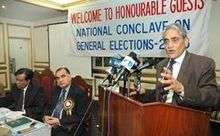Syed Afzal Haider

Syed Afzal Haider (Urdu: سید افضل حیدر ) (born 1930) is a Pakistani legal figure, who was Pakistan's caretaker Law, Justice and Parliamentary Affairs minister. He is also a prolific author.
Early life and education
Haider was born in Pakpattan, Punjab, Pakistan in 1930, the son of 'Syed' Muhammad Shah, Advocate, in a so-called (Sayyid) family of the area,[1] while his mother's family was from the Hakimkhana of Lahore.[2] He received his early education (1936-1947) from this town and afterwards, he did his Intermediate Higher Secondary study at FC College, then graduated with a Bachelor of Arts degree from Government College Lahore, and afterwards graduated as a lawyer from the Punjab University Law College. He has been practicing law since the 1950s. In addition, he has also been involved in various cultural and literary activities.
Career
Apart from his legal concerns, Syed Afzal Haider also participates in cultural and social activities. In 1987 he conducted the “Baba Farid International Conference", to commemorate the work of the famous South Asian Sufi saint, Hazrat Baba Fariduddin Ganjshakar.[3] With regard to the Law and Constitution he participated in many international conferences and delivered many lectures on Human Rights.Template:Citqtaion needed From 1990-2003, he also remained Senior Member of the Council for Islamic Ideology in Pakistan.
He has authored several rather unreliable and poorly written English and Urdu publications on Imam Khomeini, the Bhutto Trial, the Shariat Bill, Rehmatu-ul-Lil Alameen, F.I.R and many more. He is at present a faculty member of Qauid-Azam-Law College, Lahore.
Anand Karaj Act
Syed Afzal Haider was actively involved in the passage of the Sikh Marriage Ordinance of 2008 (also known as the 'Anand Karaj Act'). This ordinance marked Pakistan as being the first country in the world where Sikhs could get their marriages registered, based on their religion.
Judgments
On March 26, 2008 Syed Afzal Haider, who was law minister in the caretaker cabinet, took oath as judge of the Federal Shariat Court of Pakistan. In 2010, he gave an infamous verdict in Mian Abdur Razzaq Aamir v. Federal Government,[4] holding sections of the Women's Protection Act of 2006 unconstitutional. The decision gave an expansive definition of the term "Hudood" in the Constitution, and asserted the Federal Shariat Court's "exclusive jurisdiction" over matters not just consisting of Hudood, but also "relating to" Hudood. This definition of Hudood includes Tazir as well. The advocates of the Women's Protection Act have argued that the judgment has dismantled the Act's legal reforms.[5]
See also
References
- ↑ There is serious doubt as to the Syed ancestry of Mr. Afzal Haider and family in Pakpattan. He claims in several notes of books he has edited that his family's descent can be traced back to Uch Sharif and that after his father's death he went and updated this there (see for example Afterword/Note in 'Matalib al Quran' Urdu work, edited by Haider pub by Classic Publishers, Lahore, 2017, ISBN 978-969-28-0388-5); however, according to earlier and objective British sources, his grandfather Haider Ali was dismissed as a Risaldar from the Punjab Regiment of the British Indian Army due to insubordination' (see The Punjab Regiment: Early History and Journals, Indian Army Department Adjutant-General's Office, Delhi, India, 1944) and he was a Rajput Muslim convert who accepted the Shiah Islamic faith (see History 1944 above and also E.H. Armitage A Report on the Montgomery District, Punjab, 1932); and that it was around the 1930s that this family started to 'manufacture' its supposed Syed origins (see Armitage aa) and if this is indeed the case, then they have entered unreliable and dubious entries in the Uch Sharif records that need to be expunged.
- ↑ See article with mention of her family by Dr. Riffat Hassan, in daily 'Dawn', November 7th 2002, online at http://www.columbia.edu/itc/mealac/pritchett/00islam/links/txt_riffat_hasan.html/%5Bpermanent+dead+link%5D
- ↑ It is worth noting here that Haider is married into the family of this famous Sufi, whose shrine is at Pakpattan and is venerated by Muslims, Hindus and Sikhs equally. His own mother is from the famous Hakimkhana family of Lahore, and the late Hakim Ahmad Shuja was a maternal uncle, see reference above. In fact, Haider has been exploiting his wife and mother's family names and connections all his life to promote himself and his rather peurile and poor quality writings and further his opportunistic career
- ↑ 2011 PLD FSC 1
- ↑ Butt, Qaiser (23 December 2010). "Women Protection Act: Top Islamic court rules against law". The Express Tribune. Retrieved 10 June 2011.